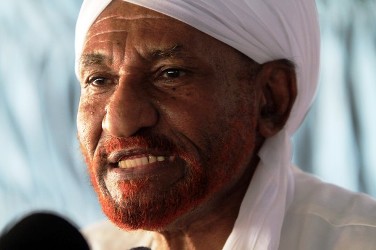Umma leader supports negotiated change in Sudan
July 11, 2012 (KHARTOUM) — Sudan’s former prime minister and leader of the largest opposition Umma National Party (UNP) Sadiq al-Mahdi renewed Wednesday his call for a peaceful change in the country and reaffirming that it can be achieved through negotiations rather than bloody revolution.

The UNP, like another large political force the Democratic Unionist Party (DUP) of Mohamed Osman al-Mirghani, was negotiating with the ruling National Congress Party (NCP) over the political future of the country after the independence of South Sudan .
The dispute with Juba over the border and Abyei, and the emergence of a new rebellion in South Kordofan and Blue Nile pushed the DUP to join the NCP government but Mahdi who is also critical to the rebel groups refused, thinking this situation might provide him an additional factor to pressure on Bashir’s party to accept his plans.
Following a series of meetings with Bashir on UNP’s participation in the government at the end of last year, Mahdi declined the offer to join the new cabine. But he announced that his party is committed to peaceful and democratic opposition. However, his son Abdel-Rahman was appointed as presidential assistant raising speculations about a deal between the two men.
Speaking to Reuters on Wednesday, the opposition leader expressed fears that a popular revolution might lead the regime to use the armed forces against the protesters and open the door for the use of violence like the current situation in Syria.
“We are committed to change, it’s just that we think it is possible that the pressures could make change with less blood. We are not reluctant. We are more experienced, and we know, let us say, the rules of the game,” Al-Mahdi emphasised.
Last week speaking to the Financial Times, Sadiq Al-Mahdi said he supports peaceful expression of popular frustration and rejection of government policy.
However he pointed out that his party does not think that time has come to engage a political defiance against the regime “until we have an alternative regime in place ” including “peace” (with rebel groups) and “democratic transformation” (constitutional conference).
The opposition forces in Khartoum including the UNP signed on 4 July a political programme for the after-Bashir regime but the rebel groups criticized the move because they were not associated in its preparation.
Al-Mahdi in the past months was very critical for the rebel groups particularly the SPLM-N for their war against the regime explaining it enables the regime to freeze the democratic transformation he calls for.
Mahdi is also in disagreement with the other opposition forces because they support the protests saying the Sudanese street used to overthrow regimes through popular uprising.
However, the organization of two successive protests after Friday prayer outside Wad Nubawi mosque, which is linked to al-Mahdi’s partisans, allowed the UNP leader to show the capability of party.
The ruling party which is used to slam Hassan al-Turabi’s Popular Congress Party (PCP) and the Communist Party avoids carefully to criticize the UNP.
Mariam Al-Mahdi, a leading UNP figure told France 24 TV that the situation in the country confirms that things are moving towards a “comprehensive change” in Sudan.
She however stressed the NCP leaders who admits the necessity of political change seek to impede the process and to make it in their own way.
The UNP representative at the opposition alliance further underscored that comprehensive regime change does not only mean to topple the regime but establish a new alternative one.
The line of the Umma party is guided by fears of political instability in the country due to the long years of war with the rebel groups and the tension with South Sudan.
Different sources say the major political forces; UNP and DUP, believe that any strong destabilization of the regime might push South Sudan to occupy disputed areas and rebel might take the control of different provinces.
(ST)
